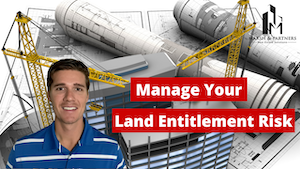What Do Rising Interest Rates Mean For Real Estate?
Since the Great Recession, we've lived in an economy with artificially low interest rates.
But to combat inflation, the Federal Reserve has begun raising rates and unraveling its expansive balance sheet - and that has both short and long-term implications for real estate.
Guide to the video
- When interest rates rise, it's less advantageous to fund investment through debt, and the economy often experiences a widespread chilling
- Investors require a higher rate of return for a project when interest rates are higher
- Development activity often slows as a result of higher interest rates, especially if demand is lower on the back-end of projects (fewer home and commercial purchases)
- Higher interest rates force the more efficient allocation of capital across the broader economy
Video transcript follows
On the surface, rising interest rates make many real estate deals less feasible.
When the cost of capital increases, projects that would have been viable with inexpensive debt may no longer make sense.
But there’s more to the story and it impacts real estate investors, developers, and business owners alike.
What’s up everyone – it’s Matt Marsh with Marsh & Partners.
Marsh & Partners is a development and national consulting firm that helps business owners and investors maximize their real estate and transform their businesses.
----------
Today we are going to talk about interest rates.
For the last decade, we’ve lived in an economy with artificially low interest rates. Debt was cheap - and investors, real estate developers, and growing businesses took advantage of the opportunity.
But in order to combat the run-away inflation we’re experiencing; the federal reserve has begun to pull the levers available that impact the interest rates felt throughout the banking system.
Ultimately, what does this all mean for real estate? When I discuss interest rates, I like to break down their implications into several broad categories - their effect on the overall economy, home buying, investment and development activity, and business expansion.
So, let’s jump right in.
Interest rates and the overall economy
To understand how rising interest rates may impact you as a developer, investor, or business owner, it’s important to understand how rates impact the overall economy.
At their core, interest rates are the price you pay for borrowing money. When interest rates are low, it encourages borrowing for growth and investment activities. And when rates creep higher, it encourages a pullback of borrowing and instead promotes saving.
So, when interest rates increase what happens is we often experience a widespread chilling effect across much of the economy.
Funds become more expensive to borrow and it’s no longer as advantageous to finance growth through debt.
This in turn generally has a negative impact on the stock market and investor psychology. And because interest rates are negatively correlated to bond prices, rising interest rates cause bond prices to fall.
You can call it an economic perfect storm – consumer spending usually falls, because people are less inclined to make big purchases and finance them, and investment activity becomes more volatile.
And as a result, these larger macroeconomic trends are felt across the real estate industry. The delivery of new housing supply to market through real estate development is impacted as well as the buy and sell-side for existing-home transactions.
How rising interest rates impact the home buying market
When interest rates rise, the cost to borrow funds also increases. So, if you think about it in terms of a monthly mortgage, a 1% increase in the mortgage rate could equate to several hundred dollars a month on a $350K house.
Conventional wisdom says the rate of homebuying tapers off because each price point becomes less affordable to a wider range of potential buyers. When demand for new homes decreases, the price of existing houses also decreases.
But if you flip the script, you can also think about it in terms of home sales. If rates are rising, homeowners will be less inclined to sell their existing home and take on a new mortgage. This usually leads to constrained supply. And when supply falls, the price of homes will increase.
So, what you have are several supply and demand forces working against each other that tend to level out transaction volume and prices.
But we’re living through a very unique situation right now. Real estate is a hyper-localized asset. Certain markets haven’t seen a slowdown in frenzied home buying activity at all even with interest rate hikes.
And despite the slowdown in new mortgage and refinancing activity, all-cash buyers continue to drive up prices in sunbelt areas.
Price appreciation has slowed a little, but it certainly hasn’t stopped – so depending on the market’s underlying demand drivers and fundamentals, rising interest rates may or may not have a material impact on the price and volume of home sales.
Should real estate investors be concerned about interest rates?
The forces of supply and demand largely impact the value of real estate assets, like almost any other good or service.
But supply and demand are only two fractions of the overall equation – the cost of capital and an investors overall real estate strategy also play an important role.
Let’s start by discussing the cost of capital and how it impacts real estate values.
An investor makes capital allocation and investment decisions based on a project’s risks and potential returns.
A project’s overall risk and an investor’s required return increases when the interest rate or cost of capital also increases. And since the required return increases, then the value or price of the real estate investment will value. An investor needs to be compensated for that risk by paying a lower price.
But that doesn’t necessarily mean investors need to be concerned about rising interest rates.
Let’s consider how rates could impact your overall real estate strategy.
Are you an investor focused on the assets value appreciation and eventual exit? Or are you more concerned with immediate and strong cash flow.
Your answer could be a combination of both, but each path requires a unique strategy at the onset.
It’s an important question to consider because depending on your strategy, interest rates could have a material impact.
Investors concerned with cash flow generally target already stabilized real estate assets with lower margin on the purchase. Rising interest rates can greatly reduce the margins on projects like this and reducing your cash-on-cash return and forcing you into a longer hold period before exit.
High inflation changes this equation slightly and may make the project profitable even if the numbers aren’t as strong as they’d normally be.
If instead, you’re a value-add investor chasing projects with weaker in place cash flow but more upside, you may be less concerned about fluctuating interest rates.
Especially because investors with average business plans may be priced out of competition. As debt becomes more expensive, inexperienced investors may have a harder time financing projects which will ultimately reduce competition.
Now if your investment decisions are made entirely based on metrics, you may have to rethink your strategy.
Higher interest rates will force the more efficient allocation of capital across the economy, which may mean away from real estate investments – but rising interest rates may be a good thing for investors.
If you have stagnant cash that needs to be deployed, just beware that you may not experience the same real estate returns success you’ve enjoyed for the last 5-10 years.
How interest rates impact real estate developers
Real estate developers are uniquely exposed to interest rate fluctuations.
Not only are they impacted by rates for their own financing, but they’re also beholden to supply and demand pressures that are also impacted by interest rates for buyers and sellers.
So, let’s first discuss development financing.
Every developer needs to contend with something called the capital stack – that’s just a fancy term for all the funds being used to complete the project. It’s usually comprised of some mixture of both debt and equity which can come from both traditional and non-traditional sources.
As interest rates rise, development activity usually slows down. Real estate development can be risky, and speculative projects that had slim margins to begin with may no longer be bankable.
But conversely, if interest rates slow the rate of development activity, then there would be a reduced demand for construction and material inputs. Reduced input costs on the front end may help to ease rising home and real estate prices despite a reduction of the delivery of new product to market.
Now in terms of supply and demand forces, a real estate developer is exposed to the whims of the overall market. If rising interest rates cause a slowdown in mortgage activity and new home purchases, multifamily developers may get a tailwind with more apartment renters and home builders could struggle.
The same goes for commercial real estate too. Build-to-rent development may be more profitable if the market consists of more tenants looking to lease instead of buy.
Should business owners be concerned about rising interest rates?
Now, should business owners be concerned about rising interest rates?
As usual, the answer to this question is, “it depends.”
More expensive debt may make you think twice about taking out a big business loan to fund business growth, especially if the margins were thin anyway.
But real estate offers a unique diversification for business owners distinct from their core operations. And marginally higher interest on a mortgage for a property owner-occupied by the business will likely not have a material impact on the company’s bottom line.
But also consider this.
What if you already own your property, but your current space just doesn’t really work for you anymore.
A sale-leaseback is an opportunity to unlock equity tied up and real estate, and may offer a cheaper means of financing a future building acquisition than a mortgage would anyway.
Consumers may end up saving more and spending less, but amidst a period of high inflation, rising interest rates may not actually impact a business’s sales volume.
----------
Now there are no steadfast rules as to how markets and industries react. We have the laws of economics and experience from past cycles to help guide our decision-making.
But every market is different. And every submarket is different. Demand drivers, underlying market fundamentals, population growth, job growth, and demographic trends are all factors that contribute to how industries respond to these pressures.
You can check out the video description for more resources to help guide your real estate decision-making.
Please if you enjoyed this video hit the like button and subscribe to our channel to stay up to date on content to help you through your real estate journey.
You can also check out our site for more real estate insights at marsh-partners.com
Feel free to leave us a comment if there are any other topics you’re interested in or would like us to cover.
Don’t forget to subscribe if you want more content like this and thanks for watching.



